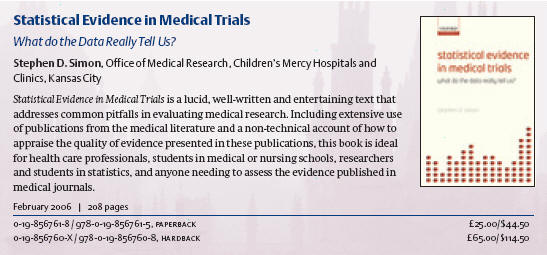[StATS]: Book reviews for Statistical Evidence (October 5, 2006)
The International Journal of Epidemiology published a review of my book, Statistical Evidence in Medical Trials, in their September 15, 2006 issue. You need to be a subscriber or pay for access, but you can find an excerpt at ije.oxfordjournals.org/cgi/content/extract/35/5/1368.
The review was fairly positive: Here’s the last paragraph:
This book is a clear, concise, and interesting read and should prove to be a useful guide. The examples and case studies make it easy to understand difficult concepts and the jokes and stories make it fun. There are some salient points and hopefully the reader will be enthused about looking at the published research and be more confident about distinguishing between the good and the bad.
Here’s a snapshot form one of the catalogs of the Oxford University Press about my book.

To see if anything else was out there, I did a Google search for
- book review “statistical evidence in medical trials”
There is a lot out there but not much of substance. Still, it’s flattering to be mentioned at all.
A review copy has been received by JAMA, according to their page, Books and Media Received, June 21, 2006. Science magazine also received a review copy according to their Weekly Books Received List, May 12, 2006.
The LibraryLink weblog has an entry, Evidence Based Medicine/Practice, that cites several books as resources, including mine. Their brief comment is that my book
is an introduction to research design and to understanding what the numbers reported in clinical trials mean for practice decisions.
Several libraries have added my book to their collection. The Alcuin Research Resource Centre at the University of York listed my book among dozens of others, but took the time to provide a nice summary for each book. This is what they wrote about my book.
Describes how to appraise the quality of evidence presented in the medical literature. Chapters look at the quality of the control group, exclusion criteria, clinical relevance of the outcome measure, corroborating evidence, meta-analysis and systematic review, explanation of statistics used, and how to search for research articles. www.york.ac.uk/inst/arrc/newresources/may2006.pdf
A Chinese web site, CTI Book, has a spreadsheet listing over a thousand math books with brief commentaries. Here’s what they said about my book:
Aimed at students and researchers in statistics and in the medical and health care sector as well as those who use and assess medical data, this book addresses common pitfalls in experimental design. The text focuses on the errors and misleading data that stem from flawed experiments, misreading of results and misuse of statistical and analytical methods in medical research.
The U.S. Amazon site has no reviews of my book, but the U.K Amazon site has one review from Benoy N. Shah:
I am a doctor working in the field of Cardiology, so the need to understand and interpret clinical trials is vital. I flicked through this book (before buying it) and was instantly captured by the honest and open style with which it is written. A lot of jargon, which has the ability to confuse, is neatly explained and relevant and frequent examples are very handy.
The Lancet has recently published a book called The Lancet Handbook of Essentials Concepts in Medical Research which I flicked through too. Though it has a more alluring cover, this book certainly reads more easily than that did.
The reson this book doesn’t get five stars, however, is due to the numerous grammatical errors. I almost can’t believe the proof-reading of the script didn’t pick them up. Incorrect use of commas and apostrophes are common, as are extra incorrect words (e.g. “If the overall a sample has a skewed demographic,…). If this can be sorted out for the second edition, that would be a big step forward.
Overall, this book is excellent and I would highly recommend it to anyone wishing to learn more about interpreting clinical research. I would also recommend that the publishers read the book and eliminate the multiple grammatical inaccuracies.
Amazon has an algorithm that recommends buying pairs of related items, and when I looked at the Amazon page for my book, here is what they recommended:

It is a true honor that the folks at Amazon think that Jane Austen and I are perfect partners.
This page was updated on October 9, 2006 to include some details from the International Journal of Epidemiology review.
This page was written by Steve Simon while working at Children’s Mercy Hospital. Although I do not hold the copyright for this material, I am reproducing it here as a service, as it is no longer available on the Children’s Mercy Hospital website. Need more information? I have a page with general help resources. You can also browse for pages similar to this one at Category: Statistical evidence.
evidence](../category/StatisticalEvidence.html). for pages similar to this one at [Category: Statistical with general help resources. You can also browse Children’s Mercy Hospital website. Need more information? I have a page reproducing it here as a service, as it is no longer available on the Hospital. Although I do not hold the copyright for this material, I am This page was written by Steve Simon while working at Children’s Mercy